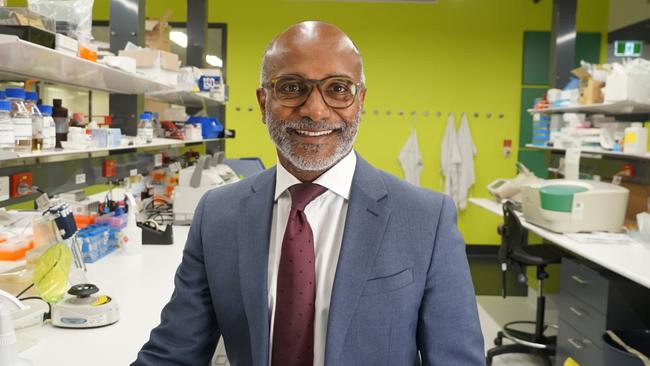Peter MacCallum researchers discover drug that helps fight cancer
A drug that tricks cancer cells into triggering their own destruction has been hailed by Victorian researchers as a “completely new weapon”.
Victoria
Don't miss out on the headlines from Victoria. Followed categories will be added to My News.
A “new weapon” against cancer that tricks cancerous cells into telling the immune system they are infected, triggering their destruction, has been uncovered by Melbourne researchers.
Peter Mac researchers worked with US biotech company STORM therapeutics to study their world-first drug which targets mRNA.
Their preclinical trial, published in Cancer Discovery, found blocking a single enzyme in cancer cells triggered a chain reaction that led to their demise.
Peter MacCallum Cancer Centre consultant haematologist and study co-author Professor Mark Dawson said the drug was unlike anything else and “a brand new way to engage the immune system”.
“You don’t get these opportunities very often, whereby you have a completely new weapon to fight cancer,” he said.
The drug had previously shown success in leukaemia trials but this study, which looked at solid tumours, has sparked hope for treating cancers such as lung or melanoma.

Successful mice trials have never been a guarantee a treatment will work in humans, but STORM therapeutics Chief Scientific Officer and study co-author Oliver Rausch said the results were “very exciting”.
“We are now embarking on clinical trials with this brand new treatment in patients with solid tumours,” he said.
The preclinical research found that when the STC-15 drug inhibited a particular enzyme, it triggered a change in an important molecule – MRNA – that made it look similar to a virus.
Prof Dawson said this duped the cancerous cell into thinking “it’s under attack by a virus”.
“(It) puts out signals to the immune system to say come and get me,” he said.
“The immune system believes the cancer cells are being attacked by a virus and they get
to work seeking out the ‘infected’ cancer cells to destroy them.”

This was important, because our immune system has struggled to recognise cancer cells as dangerous.
Professor Dawson said cancer disguised itself by using our body’s “checkpoint system”, which was designed to protect healthy cells from the immune response.
“Cells put up molecules on their cell surface that say ‘stop being so angry, stop being so active’ and inhibit that immune function,” he said.
“What cancers have evolved to do is accurately express these checkpoint molecules in their cell surface and trick the immune system to say ‘don’t attack me’.”
He said this essentially blocked the “immune system’s ability to attack the cancer” and current immunotherapy drugs worked by inhibiting these molecules.
“The problem is it only works for less than half of all patients,” he said.
This drug could help those who don’t respond to these current immunotherapy drugs, but Prof Dawson said their research also showed it could be given in combination with them, because the drug was so different.
“It makes those existing drugs even more effective,” he said.
Prof Dawson said Australia could host human trials “probably as soon as next year”.
The study received funding from an mRNA Victoria grant, a state government initiative.




